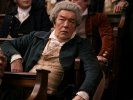Eye For Film >> Movies >> Amazing Grace (2006) DVD Review
The commentary track with director Michael Apted and actor Ioan Gruffudd is reminiscent of a headmaster talking about a cricket match with his school captain. There is no personal chemistry and precious little involvement beyond patronizing paternalism on the one hand and nervously polite small talk on the other.
Apted says that the film represented two years of his life and that it was the politics of young men taking on the establishment, rather than the horrors of the slave ships, or conditions in the sugar plantations, that interested him most. The young men were William Wilberforce (Gruffudd) and the 24-year-old prime minister, William Pitt (Benedict Cumberbatch), who’s penchant for six bottles of port a day would kill him faster than the responsibilities of his office.

The film was shot in 47 days, using multiple cameras, entirely on location. “Did I rush you through it?” Apted asks Gruffudd, as if their on-set communication was so distant that pigeon post might have felt more intimate. In one scene, Wilberforce sings Amazing Grace, a passionate anti-slavery hymn, in a reactionary gentleman’s club. “You and I never had a conversation about whether I could sing, or not,” Gruffudd says. “Well, you are Welsh,” Apted replies. “I assumed you could.”
Throughout the commentary, Apted explains to his leading actor what he was trying to do, as if Gruffudd wasn’t there. It’s very odd. “I always approach things as a documentarian,” he says, meaning, one assumes, that his training in documentaries affects the way he makes films, like the scenes in the House of Commons (“a room in the Chatham docks”) that were shot in a week right at the end. “How was it for you?” Apted asks. “Was it exhausting?”
Gruffudd is so reluctant to appear in any way controversial that his contribution is devoid of personality. The absence of humour and anecdote from either of them fits the schoolmasterly analogy and the only time emotion is let off the leash is when discussing Albert Finney, who plays the reformed slave trader John Newton (“A lesson in acting; a lesson in humanity”). Finney’s son Simon was working as a camera operator and after shooting the scene between Wilberforce and the now blind Newton, he was close to tears.
“Very few scenes were deleted,” Apted says, with characteristic efficiency, as if a deleted scene somehow implies wastage.
How Sweet The Sound: The Story of Amazing Grace is a Making Of featurette, with all that implies. The actors are here with the director, composer, William Wilberforce’s biographer and a costume designer. Also, included, for reasons unknown, is an American narrator, who sounds as if every word is so full of import you might be struck by lightening if you don’t listen.
Everyone talks about the man, rather than the film, and how important they feel it is to tell his story. The characters who bring life to the production are the ones with the most personality off screen – Rufus Sewell, Romola Garai, Albert Finney, Michael Gambon, Ciaran Hinds. Suddenly, without warning, a fresh-faced young man, possibly from California, is talking about the Amazing Change Movement which is trying to eliminate modern slavery throughout the world. That’s a whole other thing - interesting, but other.
The music video with Chris Tomlin is a must-miss. A small, blond, unshaven man sings The Song. The earth does not move.
Reviewed on: 06 Aug 2007



















